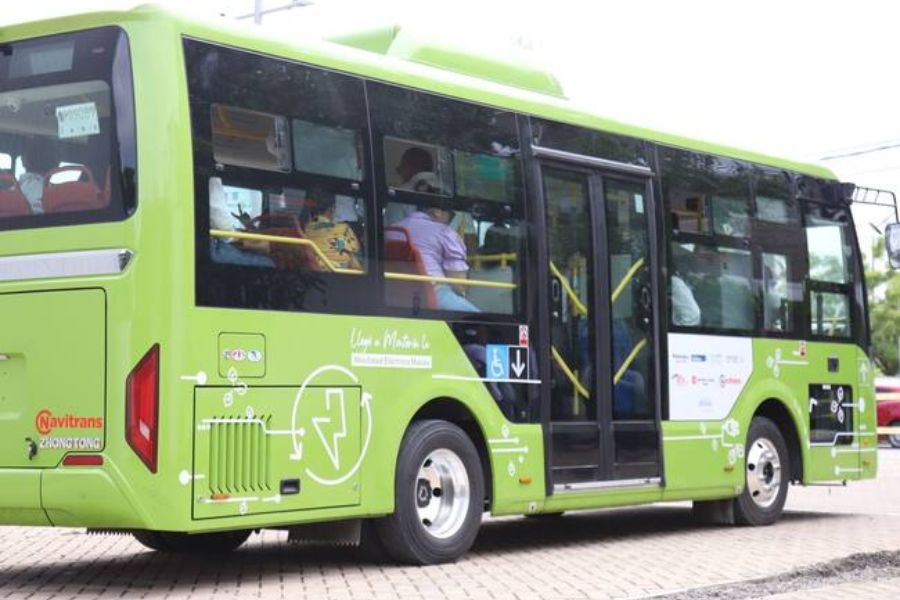In several Caribbean countries, electric buses are emerging as strategic allies in improving urban mobility due to the geographical dimensions of these nations.
In this regard, the adoption of low-emission transport is presented as a highly viable option in the region. In fact, the importation of fossil fuels and the emphasis on renewable energies promote the transition.
Despite these favorable conditions, the question arises: what is the reality of electric buses in the Caribbean?
Guatemala
The Municipality of Guatemala is making significant investments in the necessary infrastructure for the implementation of electric buses in the capital.
Recently, it was reported that Q15 million will be allocated for the acquisition of chargers, essential for the operation of these vehicles.
It is worth mentioning that this announcement comes after the signing of a contract worth over Q99 million for the rental of 24 electric buses earlier this year.
Panama
In Panamanian territory, there are funds incentivising the incorporation of electric buses.
An example is the case of MiBus, which requested funds from the Government and Inter-American Development Bank (IDB) to advance towards the goal of 414 electric buses by 2025.
“We have physically identified the sites where the buses will be located with their chargers,” says Luis Campana, General Manager of MiBus, to Mobility Portal Latin America.
He adds, “Given that a significant portion of the current fleet has already exceeded 13 years of service and 800 thousand kilometers traveled, it is necessary to begin the replacement process.”
Furthermore, he explains that they will take care of the charging infrastructure themselves and install the necessary viaducts for the supply of electrical power from the main road.
Additionally, another 50 buses would be incorporated through an internal tender, using their own funds.
Dominican Republic
In the Dominican Republic, a plan focused on tourism is underway, which includes the implementation of electric buses.
Dubbed as the “Colonial City Mobility Plan: a historical and cultural bus tour,” this initiative aims to promote historical and cultural tourism while driving the adoption of electric transport in the region.
As part of the revitalization project of the Colonial City, promoted by the Government with funds from the Inter-American Development Bank (IDB), the European Community joins to finance the “Mobility Pilot Plan,” which includes the creation of a transportation circuit or route connecting the historic district with the Plaza de la Cultura.
It is an idea designed for both domestic and foreign tourists but will also benefit residents in the walled city. The route has been designed for a length of 12 kilometers, and initially, six electric buses with a capacity to transport 25 passengers will be used.
For the purchase of buses and chargers, the European Community has allocated one million euros.
Meanwhile, the IDB, through the Comprehensive Tourism and Urban Development Program of the Colonial City, will contribute around one million dollars for the construction of terminals or loading yards, signage, and stops.
The electromobility plan is in the preparation phase and includes the installation of 34 stops (17 in each direction) along the 12-kilometer route with an approximate duration of 40 minutes.
Costa Rica
The Costa Rican Executive Branch is refining a proposal to concession electric charging stations that would be operated by bus companies.
This topic was discussed in the board meeting of the National Concessions Council (CNC) on December 19, 2023, and was presented by Luis Amador Jiménez, Minister of Public Works and Transport, who is also the president of that body.
According to local media reports, the Chaves Robles Administration (2022-2026) has a plan on the table to secure funds to subsidize the purchase of electric buses by bus companies.
Amador informed the CNC leadership “informatively” that they would work to generate the terms of reference for the concession proposal with technical cooperation from other countries.
An alternative, as mentioned, would be the government of Portugal.
Puerto Rico
Funds for potential investments in electric bus fleets are coming to Puerto Rico from the Federal Highway Administration, which allocated $48 million for highway bridge improvements and the electric vehicle program during this fiscal year 2024.






